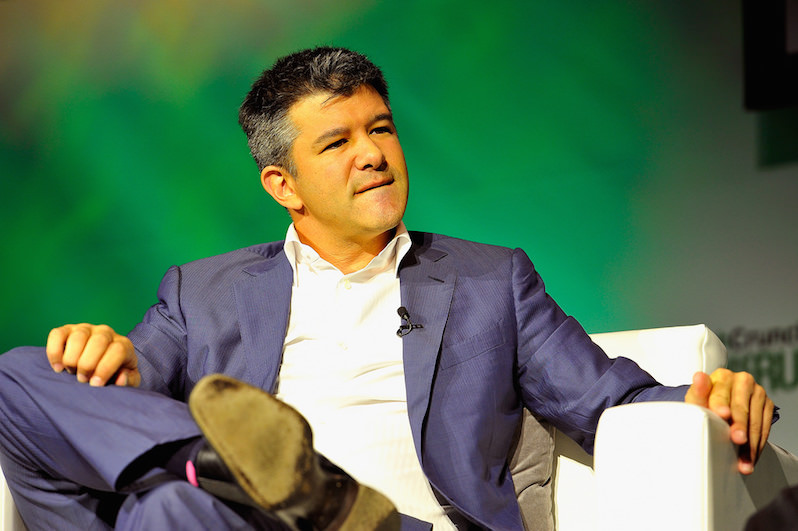Can a New CEO Save Uber After Travis Kalanick’s Departure?
Some analysts think the ride-service company may not survive unless it changes its business model—and fast. Travis Kalanick at TechCrunch Disrupt in 2014. (TechCrunch / CC BY-SA 2.0)
Travis Kalanick at TechCrunch Disrupt in 2014. (TechCrunch / CC BY-SA 2.0)
Travis Kalanick at TechCrunch Disrupt in 2014. (TechCrunch / CC BY-SA 2.0)
Travis Kalanick is out as Uber’s CEO, and some analysts think the ride-service company may not survive.
Uber could become the “Enron of the transportation industry” if Kalanick’s successor doesn’t change Uber’s business model, according to Steven Hill, a senior fellow with the New America Foundation and author of five books, including “Raw Deal: How the Uber Economy and Runaway Capitalism Are Screwing American Workers.”
Hill provides a blueprint in a Salon article:
Here’s my recommendation for the “new Uber” and its new leadership. Whoever replaces Kalanick should:
1. Focus the company on being a U.S.-based taxi business. 2. Follow former Obama attorney general Eric Holder’s recommendations to root out the destructive bro culture. 3. Parlay its popularity among its user base to raise fares a bit. 4. Hit “reset” on its relationship with its drivers, since it looks like it is stuck with them for a good while longer. 5. Focus on being a law-abiding, responsible corporation that provides a good service at a price that remains affordable for customers but can also achieve profitability. 6. Drop foolhardy futurist ideas like self-driving or self-flying vehicles that have no chance of succeeding and are a waste of its resources and attention span. 7. Cooperate more with local officials to use the company’s tracking technology in an effort to reduce the horrible traffic congestion that is plaguing city after city. That would mean sharing data so its drivers can be tracked, and helping cities to use its technology to track traffic flows and create congestion zones like in London and Stockholm.
Uber rose to a $70 billion valuation under Kalanick’s leadership and an “Animal House”-style business plan, but the 40-year-old, who co-founded the company with Garrett Camp in 2009, was forced to resign this week after being pressured by investors following a string of scandals.
“I love Uber more than anything in the world and at this difficult moment in my personal life I have accepted the investors’ request to step aside so that Uber can go back to building rather than be distracted with another fight,” Kalanick said in an email to employees, Reuters reported.
Controversies included allegations of sexual harassment, bullying and discrimination and a lawsuit alleging that a former Uber project head stole self-driving car secrets from Google. Kalanick hired the law firm of former Attorney General Eric Holder Holder to investigate the allegations. Holder’s report recommended less responsibility for Kalanick, who helped grow Uber fast by promoting a cutthroat company culture.
Despite Uber’s growth, the company still suffered from a common Silicon Valley startup problem — making money. Hill explains:
Beyond all the scandals, the other enormous pressure on Kalanick has been the fact that Uber is yet another Silicon Valley startup company that has failed to earn a profit. The dirty little secret is that seven out of 10 startups in Silicon Valley fail, and Uber is on track for being one of them. Uber has become popular as a taxi company for the digital age, yet it is still hugely unprofitable, losing nearly $3 billion in 2016 (and possibly another billion in China), and it has already lost $700 million in the first quarter of 2017. Despite Uber’s popularity with its users, Kalanick has not figured out a way to introduce any new efficiencies into his business model that would allow this company to provide a taxi service in a more competitive, cost-effective way than regular taxi companies. Consequently, Uber has become stuck in a pattern of using its venture capital funding to subsidize at least 50 percent of every ride in order to cut fares and try to gain a monopoly position that can drive the competition out of business. In the ultimate irony, the more customers use Uber, the greater into debt it goes.
In March, Uber director Arianna Huffington said the board still supported Kalanick. She thought he could be redeemed. The negative press, however, proved too much to overcome.
“Even though Kalanick was driving performance, the company is not sustainable in this form,” Jennifer Chatman, a business professor at the University of California at Berkeley, told The Associated Press. “The company is quite vulnerable to very, very expensive lawsuits. He couldn’t stay.”
Not everyone agrees. After Kalanick’s fall from grace, Silicon Valley heavyweights including venture capitalist Bill Gurley continue to praise him as a model visionary.
There will be many pages in the history books devoted to @travisk – very few entrepreneurs have had such a lasting impact on the world.
— Bill Gurley (@bgurley) June 21, 2017
Some Uber employees even want Kalanick to return. According to BuzzFeed News, managers are encouraging workers at the company to sign a petition to reinstate Kalanick as CEO. (He remains on Uber’s board.)
“Uber is TK and TK is Uber,” the note reads, referring to Kalanick’s internal nickname.
“TK, no matter his flaws (everyone has them) was one of the best leaders I have seen,” the email continues.
The email also said employees should contact Uber board members Arianna Huffington and Garrett Camp, as well as former member Bill Gurley, to let them know they are unhappy that Kalanick resigned.
Holder thinks Uber can bounce back, but no one knows whether Kalanick’s departure will be good or bad for the company. For now, it’s both.
Your support matters…Independent journalism is under threat and overshadowed by heavily funded mainstream media.
You can help level the playing field. Become a member.
Your tax-deductible contribution keeps us digging beneath the headlines to give you thought-provoking, investigative reporting and analysis that unearths what's really happening- without compromise.
Give today to support our courageous, independent journalists.





You need to be a supporter to comment.
There are currently no responses to this article.
Be the first to respond.